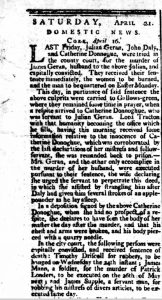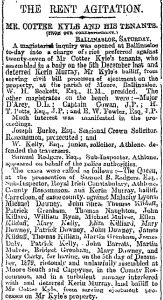
The cost/benefit balance in researching newspapers used to be all wrong. Any attempt to zero in on specific events or families would inevitably get side-tracked: you’d just end up reading the paper. That could be very enjoyable – the accounts of public hangings in the eighteenth century are hair-raising – but unless you could spare a week, the time expended just wasn’t worth the results. And the working presumption was that these publications were really only of interest if the people you were researching were similar to their readership – literate, propertied, urban, English-speaking.
Everything is different now. Two commercial sites, irishnewsarchives.com and britishnewspaperarchive.co.uk, have opened up a vast range of titles and transformed the way historic newspapers can be used.
The latter site is (obviously) British, part of the DC Thomson stable, so all of the Irish titles it digitises are also available on its sister site, FindMyPast.ie. The aim behind it is simple and vast: to digitise all the historic newspaper holdings of the British Library.
The BL has the world’s biggest collection of nineteenth-century Irish titles, so its usefulness is obvious. From 1822, every newspaper in the then-United Kingdom had to hand over a copy as part of the stamp-tax process. From 1869, the Library’s legal deposit rights were extended to newspapers. It seems to have taken a few years for news of the stamp-duty rule to reach Ireland – most of the BL’s Irish holdings date from around 1826. But after then, virtually everything is here or on its way, from the Athlone Sentinel (1834-1861) to the Wexford Independent, (1830-1871).

The Irish site, irishnewsarchives, was initially based around the archives of the Irish Independent group, Independent News & Media, including all the provincial papers gobbled up by that group over the past few decades. It has since expanded greatly, possibly spurred by the threat of its British rival and now includes the full run of the late lamented Irish Press (1931-1995), as well good collections of the Freeman’s Journal and the Belfast News Letter from the early 1700s. At its heart, though, remains the INM stable of local newspapers, for which it also acts as an ongoing archive. So if you want to know what the people of Cavan and Monaghan were concerned about last December, The Anglo-Celt archive will tell you.
As with all online record-sites, commercial or not, caution and scepticism are needed. There are unmarked holes in both sites’ coverage, to be uncovered mainly by falling into them. Both use automated Optical Character Recognition, whose flaws mean that ingenuity and persistence are often necessary – pick a conspicuous name or word and plug away at the advanced search interface.
The British site’s interface is much quicker – irishnewsarchives seems to be stuck with old Microsoft database and web software that can be maddeningly slow. But there is no question of it becoming superfluous. Legal deposit ended in 1922 for newspapers in the South (though for some reason the BL has a full run of the Waterford Standard from 1951 to 1954), so the Irish site has an effective monopoly on publications after that year, making it essential for twentieth-century death notices, politics and local news. The Irish site also has much better nineteenth-century runs of the local newspapers that are now part of INM. And you can get a discount on subscriptions by using the code “JGDISC25” (only available via johngrenham.com, subject to availability, while stocks last …).
On the other hand, the sheer indiscriminateness of the britishnewspaperarchive approach (“hoover it all up and let God sort it out”) means that it will always have some things unavailable on irishnewsarchives.
For both, the biggest change is that every name in every paper is now findable. And large tracts of all newspapers consist of personal names – prize-winners, convicts, the complete under-13s B team … One way to get Mammy to buy the paper has always been to print little Johnny’s name.

The social range of reporting also turned out to be much broader than I used to expect. The Grenhams of Moore, most definitely not Irish Times readers, are listed with droves of cousins and in-laws in a Times Ballinasloe court report in 1880, arrested for preventing a bailiff evicting a neighbour. They were obviously keen participants in the Land War, something no one in later generations knew, and which only emerged because of digitisation.
So there is no doubt these two sites have moved newspaper research from the margins to the centre of Irish family history.
But. There. Are. Quibbles. Of course. Of which more next week.
Thanks for educating us on these late developments.
Really good to know that some of the newspapers go back into the 18th century! My known northern Irish ancestors emigrated, or perhaps returned, to Scotland in the 1790s, so this is really the first I’ve heard of searchable sources that just might provide a crumb or two of information. Thank you!
I’ve used both the newspaper search in findmypast and britishnewspaperarchive and found lots of mentions of my Kindlen/Kindalen relatives from Cavan in Dundee. The advantage of findmypast is that they don’t just have British or Irish newspapers.
I’d be remiss if I didn’t bring up the fact that there was no mention of the thoroughness of details of births or obituaries, and ease of access to them, which I believe is of interest to us all. Can you please enlighten us in your next blog release? Thanks in advance John.
While there is undoubtedly a massive amount of information available in the newspaper archives on the two websites you identify, in my experience the search functions on both are extremely limited and a massive amount of work is required to sift through the search results to find any useful information.
John
These are very useful sites. I have spent time browsing newspapers mainly for BDM and have the results on my site nickreddan.net.
The British newspapers often report on Irish activities. In addition, you can find quirky things like people from Balbriggan and nearby places giving a testimonial to their former CoI clergyman who has got a job in England in the Derby Mercury – Wednesday 03 June 1835.
With reference to the British Library holdings – the Leinster Leader is another southern Irish paper with later holdings, 1948-1955 have just come online. Digitisation of some Northern Irish papers goes well into the 1950s e.g. the Lisburn Herald & Antrim & Down Advertiser covers 1891-1956.
Might be useful for people without subscriptions to know that you can access irishnewsarchives for free on the computers at Irish libraries (if you have the patience to wait for the searches!).
Thank you. I will use these sites trying to find my relatives who immigrated from Cavan to Canada in 1813 .
Thanks John. I have also used the archives courtsy of FMP to discover that my lot were fierce fond of the drink in years gone by.
British and Irish newspapers of the 19th century tend to overlook the poorer folk unless they were involved in a newsworthy story. Later 20th Century newspapers are more useful for their wider coverage of family notices and researchers everywhere would welcome access to more of these.
Is it possible to browse the newspapers in Findmypast? I can only seem to search them. I know around what date I want but I can’t seem to ask the Advanced Search in a way that brings that up.
Found lots of info on my ancestral family from Latteragh, Tipperary in the Nenagh Guardian at Irishnewsarchives. Was able to confirm the first name of my great great great grandfather, the family burial plot, and the first time I saw their Ryan nickname in print. I think all I found at Findmypast was their dog license.